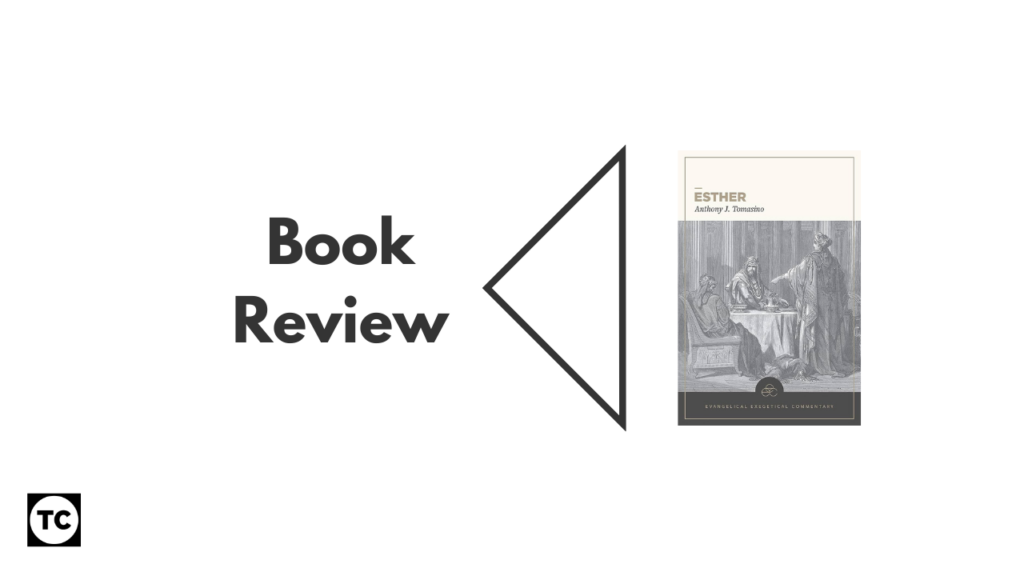Reviewing commentaries is a tricky business – particularly for me as a generalist, and an in-publisher editor of commentaries! I tend to offer my review based on the format and content of the volume, and it’s utility or otherwise to preachers and pastors. Occasionally I’ll digress into particularly theological or stylistic quirks.

Esther is an interesting book. As Chloe T. Sun ably expounds in her helpful Conspicious in His Absence, Esther and the book of Song of Songs are both notable for God’s absence, and yet there is more to it than that. Tomasino – presently serving as a United Methodist lead pastor, after a teaching career at Bethel College, the University of Chicago and Asbury Seminary, according to his cv – has written a helpful and readable commentary, in Lexham Academic’s ‘Evangelical Exegetical Commentary’ [henceforth EEC]. The EEC is a ‘premier’ and ‘exegetical’ commentary – in my experience (To date, this volume and the two volumes on Exodus) it is a blend of the NICOT and WBC appraoches, with a little more biblical theology. Relatively readable, the EEC is thoroughly referenced and indexed – as you might expect from the publishing house associated with Logos Bible Software!
In his 135 page introduction, Tomasino identifies the book of Esther as “a court tale with comedic elements” (p. 71), and suggests that “Esther is a potentially dangerous book, capable of inciting passion and resistance” (p. 79). He notes the hiddness of God in the narrative as being important (p. 117), arguing that “in Esther, it is not so muhc human courage or virtue that is on display as divine beneficence” (p. 124). This lenthy introduction – which is solid and helpful – precedes a select bibliography, before the commentary proper.
The layout of the EEC draws from the NICOT in terms of the Introduction>translation>textual notes>commentary process, but adds ‘Biblical Theology Comments’ (a little like Lexham’s sister series the Evangelical Biblical Theological Commentary), Application and Devotional Implications, and a ‘Selected Bibliography’ for each section of the commentary (A little like the WBC – this does break it up in terms of readability). These sections are, of course, all somewhat interlinked – for example in the Commentary section on Esther 2:1-18a Tomasino writes “The real focus of the story will soon become apparent: it is not the intrigues of the Persian court that are primary, but the fortunes of Israel” (p. 176). Elsewhere, for example in the ‘Biblical Theology Comments’ section on Esther 8:1-9:32, a swathe of themes are drawn together: “The atonement was not God’s effort to make the best of the unanticipated death of Jesus; it was God’s plan from the beginning…” (p. 343), rolling on to the ‘Application and Devotional Implications’: “The idea of reversal is more than a literary motif, and it is more than a recurrent biblical theme. Indeed, it is even more than a theological proposition. For the Christian, it is an existential reality, the foundation of our identity in Christ. Like the Jews in the book of Esther, we were under the decree of destruction… The decree of death was overturned, not because of the will of a mortal sovereign, but because of the merciful intervention of God” (p. 343). Ultimately, for Tomasino, the book of Esther reveals that “It is not that God is nowhere, but that He is everywhere, hidden in plain view in the grand design of our everyday lives” (p. 364).
Esther is an intriguing book of the Bible – and Tomasino’s commentary made me want to preach it and study it with others – which is a good thing! The EEC is a slightly fiddly format to get to grips with, but if you stick with it then it can result in a solid, readable and usable commentary. The format perhaps works best on smaller books like Esther (I’ll be going through the Johannine letters later this year with an EEC, so we shall see!) – giving space for the author to stretch their legs and try to hear God’s voice in the text. I’d recommend this book, with the caveats that you’d probably want to pick up Debra Reid’s Tyndale Commentary (not mentioned in Tomasino’s) and Chloe T. Sun’s aforementioned Conspicious in His Absence.
5/5
Leave a Reply